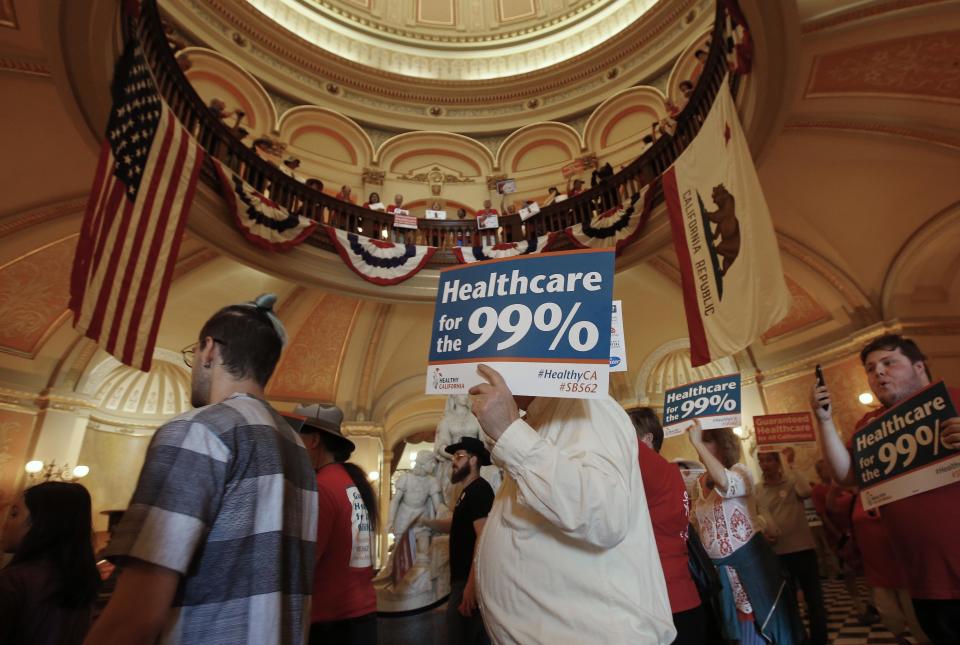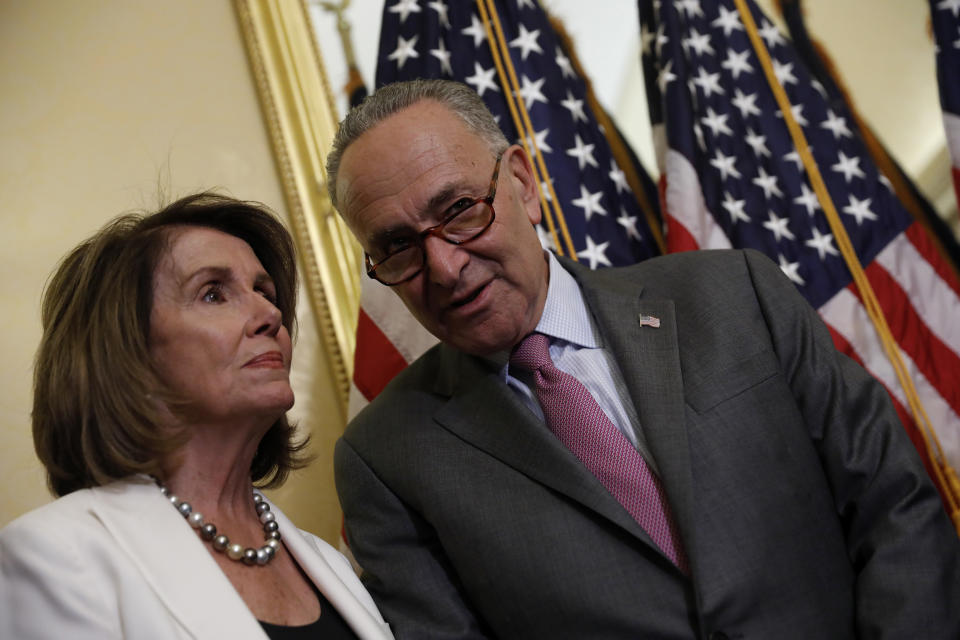Confront Trump or try to work with him? California Dems are at the forefront of the debate.

The day after Donald Trump was elected president, California’s top two legislators announced in a joint statement that the Golden State would be “lead[ing] the resistance” to Trump’s agenda.
“California will defend its people,” declared Assembly Speaker Anthony Rendon and Senate President pro Tempore Kevin de León, both Democrats. “We are not going to allow one election to reverse generations of progress.”
For the next 10 months, much ado was made over California’s “pugilistic posture,” toward the president, as the Los Angeles Times recently put it. Ambitious left coast politicians seized on every available opportunity to remind voters that they opposed the man in the Oval Office. Again and again, California touted itself the one place powerful enough — and progressive enough, with Democrats leading the entire government — to thwart the commander in chief.
But how much of this “resistance” was rhetorical, and how much was substantive?
Now’s the time to ask. On Friday, California’s legislative year finally ended. Lawmakers departed Sacramento for their home districts, not to return until January. In their wake they left a trail of legislative successes — and failures — that hold important lessons for national Democrats still figuring out how to move forward under Trump’s rule.
The main takeaway? That even in a progressive paradise like California, where Republicans are almost entirely powerless, the Democratic Party is deeply divided over how, exactly, to resist: with protest or with pragmatism.
On Sunday, Rendon described 2017 as California’s “most productive and progressive legislative session in memory.” He had a point. Legislators sent hundreds of bills to Gov. Jerry Brown, nearly all of which addressed key liberal priorities: lower drug costs, free community college, more parental leave, increased education funding, more affordable housing.
It’s also true that most of Sacramento’s big, headline-grabbing moves wound up being about Trump in one way or another. Over the course of 2017, California Democrats introduced more than 35 “#stateofresistance” bills meant to block the president’s policy agenda, according to the L.A. Times; four have since become law or part of the state budget, and eight more await the governor’s signature.

After Trump refused to release his income tax returns, for instance, Sacramento sent Brown a bill – not yet signed — that would deny California ballot access to any future presidential candidate who does the same. When Trump yanked America out of the Paris climate agreement, Sacramento extended Brown’s landmark cap-and-trade program. When Trump continued to rail against illegal immigrants, Sacramento set aside $65 million to fund legal assistance for residents facing deportation — and then, after Trump announced he was ending President Barack Obama’s Deferred Action for Childhood Arrivals (DACA) program, ponied up another $10 million in loans for college students brought to the country illegally as young children.
The list goes on. When Trump’s education secretary, Betsy DeVos, moved to roll back Obama-era Title IX guidance, Sacramento beefed up state regulations designed to prevent sexual harassment and sexual violence at schools and colleges. And after Immigration and Customs Enforcement officers stepped up their raids under Trump, Sacramento passed a bill that would transform California into a “sanctuary state” of sorts by limiting communication between law enforcement and federal immigration authorities.
The legislature’s resolutions, which do not carry the force of law, were even more antagonistic toward Trump. One demanded that Congress censure the president for his equivocal response to last month’s violent white supremacist rally in Charlottesville; another seized on his popular-vote loss to call for the end of the Electoral College. All in all, Sacramento passed more than two dozen Trump-bashing resolutions before adjourning for the year, according to the L.A. Times.
And yet, despite the flurry of anti-Trump activity, serious fissures developed over the course of the session between two types of Democrats. Call them the protesters and the pragmatists.
The protesters, led by De León, tended to be concentrated in the more liberal state Senate.
“Donald Trump is a threat to everything we stand for as a great state,” de León recently told the L.A. Times. “So it’s not just as president of the Senate, or as a senator, but more importantly as an ordinary citizen and son of a single immigrant mother that I take these positions.”
Meanwhile, Rendon emerged as a brake on the Senate’s ambitions, declaring as early as February that he was tired of talking about Trump and publicly fretting in his L.A. Times interview last week that, at times, Democrats had “devolved into symbolism.”

As a result, many anti-Trump bills were “scaled back from their original sweeping premise,” as the Times put it; others “flamed out entirely.” De León’s sanctuary state bill squeaked through at the last minute, but only after the governor and police softened its protections for undocumented immigrants convicted of certain crimes. The L.A. Times added that: “De León’s proposal to enshrine large portions of federal environmental regulations, such as clean air and water protections, into state law — in anticipation of rollbacks from the Trump administration — withered without a vote Friday night. And two bills that would punish private companies that aided Trump in his as-yet unrealized bid to build a wall on the country’s southern border failed to advance.”
Sacramento’s most spectacular flameout, however, involved single-payer health care (as we previously reported). With Trump’s push to repeal Obamacare dominating the agenda in Washington, D.C. — and California Democrats suddenly enjoying supermajorities in both houses of the state legislature — two state senators earlier this year introduced a bill (SB 562) designed to wipe out California’s private insurance market and create a single-payer system.
The old barriers, it seemed, had finally broken down. The stars were aligned. But after SB 562 passed the Senate, Rendon (who insists he supports single-payer) abruptly intervened in late June and shelved the bill for the remainder of the 2017 session.
“SB 562 was sent to the Assembly woefully incomplete,” Rendon snapped. “Even senators who voted for SB 562 noted there are potentially fatal flaws in the bill, including the fact it does not address many serious issues, such as financing, delivery of care, cost controls, or the realities of needed action by the Trump administration and voters to make SB 562 a genuine piece of legislation.”
Gov. Brown, meanwhile, piled on.
“Where do you get the extra money?” Brown told reporters. “You take a problem and say I’m going to solve it by something that’s even a bigger problem, which makes no sense.”
Progressive activists were furious. Rendon and his family received death threats. Outside the speaker’s Capitol office, one protester pretended to stab a bear in the back with a fake knife; the blade had “Rendon” written on it.
Sacramento’s single-payer implosion neatly illustrates the larger conflict that will continue to bedevil national Democrats as they struggle to chart a path back to power in the Age of Trump. Is protesting the president with passionate rhetoric and pie-in-the-sky policy proposals the best way to regain control in Washington, D.C.? Or is pragmatism the smarter play?
It’s a conflict that’s been on vivid display on Capitol Hill in recent days. Last week, Sen. Bernie Sanders finally introduced his signature “Medicare for all” legislation, and several top 2020 presidential hopefuls — Sen. Kamala Harris of California, Sen. Cory Booker of New Jersey, Sen. Elizabeth Warren of Massachusetts and Sen. Kirsten Gillibrand of New York — quickly signed on to co-sponsor the bill.

But Nancy Pelosi — the leader of the House Democrats and a Californian herself — did not.
“I don’t think [single-payer] is a litmus test,” Pelosi told the Washington Post, instead calling on Democrats to release a wide range of proposals to fix and improve the Affordable Care Act (aka Obamacare).
“It isn’t helpful to tinkle all over the ACA right now,” Pelosi added in an interview with MSNBC. “Right now we need to support the Affordable Care Act and defeat what the Republicans are doing.”
This isn’t the only time Pelosi has angered the protest wing of her party. Earlier this year, Pelosi refused to require that every Democrat support abortion rights, noting that many of her relatives “are not pro-choice.” (“You think I’m kicking them out of the Democratic Party?” she scoffed.) And in recent weeks, Pelosi and her Senate counterpart, Minority Leader Chuck Schumer, have struck a pair of deals with President Trump, first on the debt ceiling and then on DACA. In response, angry protesters confronted Pelosi in San Francisco on Monday, chanting “All of us or none of us” and “We are not a bargaining chip.”
Pelosi’s strategy is fairly simple: accomplish as much as possible, given the circumstances — then let the electoral chips fall where they may. “You can never satisfy everybody,” she told the Post last week. “We don’t have a responsibility to get nothing done.”
Whether that sort of pragmatism will pay off at the ballot box remains to be seen. Meanwhile, the protests will continue — in California and beyond.
Editors’ note: This article has been updated to reflect several additional attributions to the Los Angeles Times that did not appear in the initial piece.
_____
Read more from Yahoo News:


